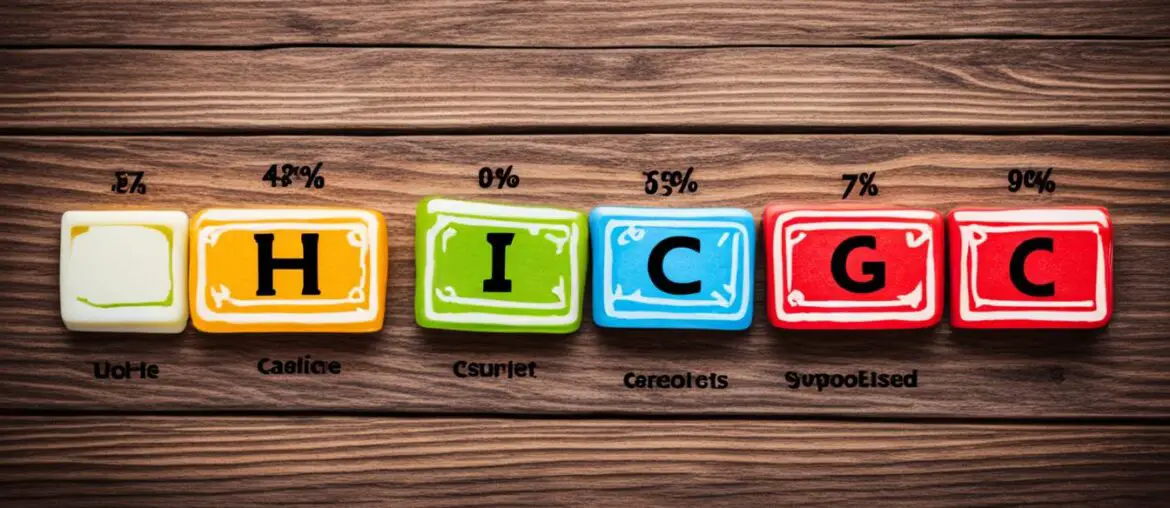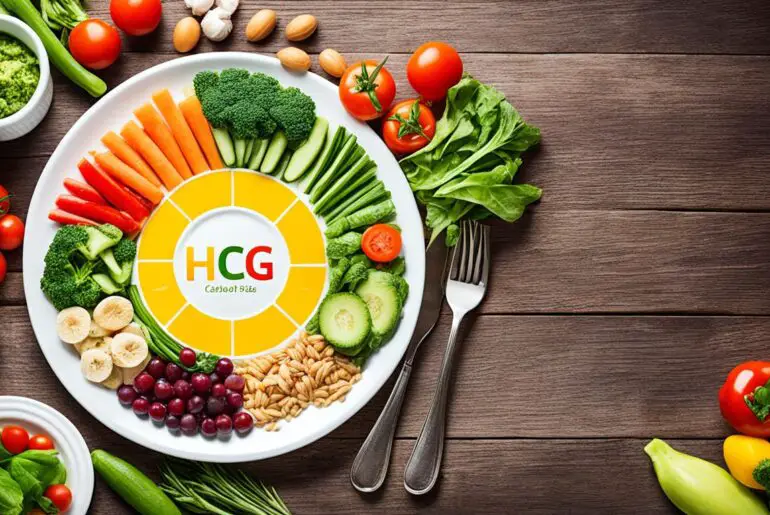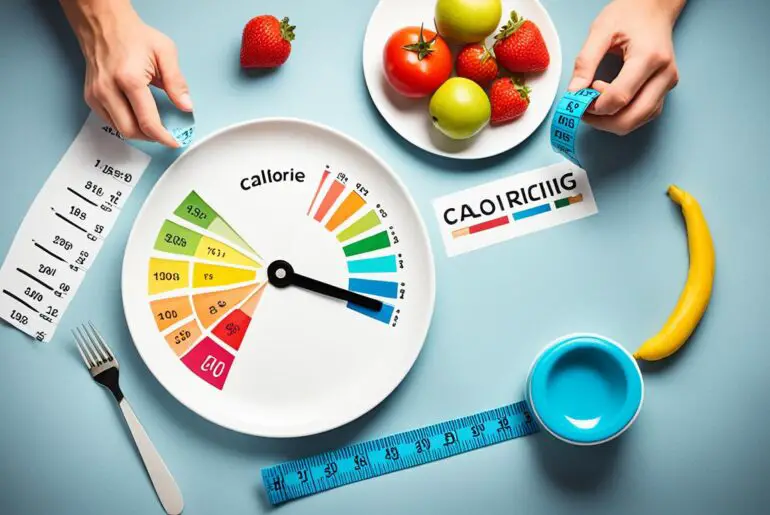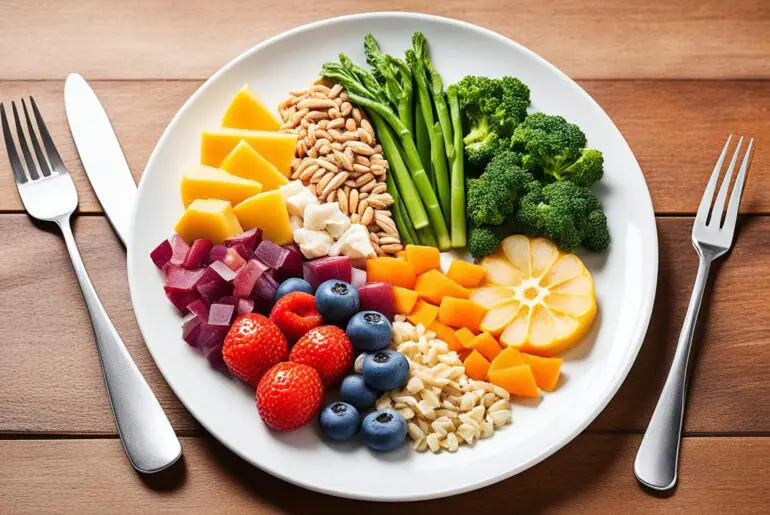Are you looking for a quick and effective way to shed those extra pounds? Have you heard about the HCG diet and its promises of rapid weight loss? But, have you ever wondered if this diet plan is truly safe and effective? Let’s delve into the world of the HCG diet and explore the truth about its nutritional calorie balance.
Key Takeaways:
- The HCG diet combines severe calorie restriction with HCG supplements or injections.
- The FDA does not approve of HCG products for weight loss.
- Dangerous risks and side effects are associated with the HCG diet.
- There are safer and more sustainable methods for weight loss.
- Consult with a healthcare professional before starting any new diet plan.
Is the HCG diet safe and effective?
The safety and effectiveness of the HCG diet, a controversial weight loss plan, are subjects of concern and debate. The FDA has not approved HCG supplements or hormone injections for weight loss, questioning their safety and efficacy. Extreme calorie restriction, a key component of the HCG diet, can pose risks to overall health and well-being.
Severe calorie restriction, as recommended by the HCG diet, can lead to various health risks and side effects. These can include the formation of gallstones, irregular heartbeat, nutrient deficiencies, and electrolyte imbalances. In some cases, research suggests a potential increase in cancer risk associated with HCG weight-loss products.
It is crucial to prioritize safety when embarking on a weight loss journey. Safer and more sustainable methods for weight loss should be considered in place of the HCG diet.
| HCG Diet Safety | HCG Diet Effectiveness | HCG Diet Risks |
|---|---|---|
| Not proven to be safe by the FDA | Questionable effectiveness without sufficient scientific evidence | Potential health risks and side effects of severe calorie restriction |
| HCG supplements and hormone injections are illegal for weight loss | Lack of FDA approval for HCG weight-loss products | Increased risk of gallstone formation |
| Irregular heartbeat and electrolyte imbalances | ||
| Possible nutrient deficiencies | ||
| Potential increase in cancer risk |
What is HCG and how does it work?
HCG, or human chorionic gonadotropin, is a hormone produced during pregnancy. It is used medically to treat fertility issues but is not approved for over-the-counter use or weight loss.
The HCG diet claims that the hormone boosts metabolism and leads to rapid weight loss, but scientific evidence does not support these claims. Studies have shown that weight loss achieved on the HCG diet is solely due to extreme calorie restriction, not the HCG hormone itself.
“Weight loss achieved on the HCG diet is solely due to extreme calorie restriction, not the HCG hormone itself.”
HCG does not significantly reduce hunger or prevent muscle loss. While the HCG hormone plays a role in regulating metabolism and supporting a healthy pregnancy, its influence on weight loss is minimal compared to the drastic calorie reduction the diet promotes.
In fact, research suggests that the HCG hormone does not have any direct impact on weight loss mechanisms. The weight loss experienced while following the HCG diet is primarily the result of consuming a very low-calorie diet.
| Fact at a Glance | Scientific Evidence |
|---|---|
| HCG boosts metabolism and leads to rapid weight loss | No scientific evidence to support this claim |
| HCG significantly reduces hunger | No significant appetite-suppressing effects |
| HCG prevents muscle loss | No evidence to support this claim |
Therefore, it is important to understand that any weight loss experienced while following the HCG diet is a result of the severe calorie restriction rather than the action of the HCG hormone itself.
“Any weight loss experienced while following the HCG diet is a result of the severe calorie restriction rather than the action of the HCG hormone itself.”
It’s essential to approach weight loss in a safe and sustainable manner, focusing on a balanced diet and regular exercise rather than relying on the unproven and potentially risky HCG diet.
The phases of the HCG diet
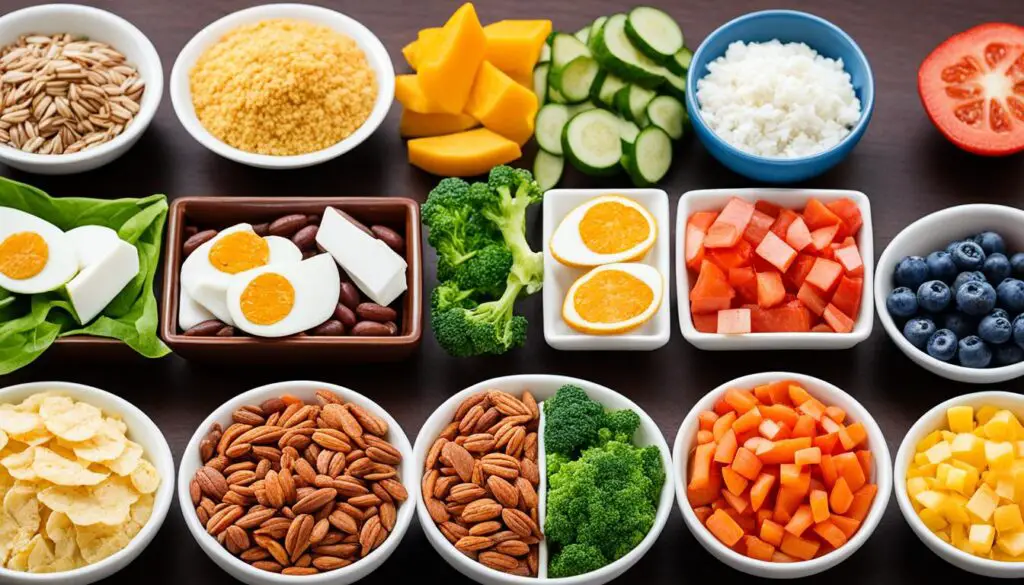
The HCG diet consists of three phases: the loading phase, the weight loss phase, and the maintenance phase.
The Loading Phase
The loading phase of the HCG diet involves consuming high-fat, high-calorie foods for two days while taking HCG supplements or injections. This phase aims to build up fat stores in preparation for the following weight loss phase.
The Weight Loss Phase
The weight loss phase of the HCG diet is characterized by severe calorie restriction, with only 500 to 800 calories consumed per day. It is during this phase that individuals continue to use HCG supplements or injections to support weight loss. The duration of the weight loss phase can vary depending on individual weight loss goals.
The Maintenance Phase
The maintenance phase of the HCG diet gradually increases food intake while avoiding sugar and starch for three weeks. This phase allows the body to stabilize and adjust to a higher calorie intake without undoing the weight loss achieved during the previous phases.
Here is a table summarizing the phases of the HCG diet:
| Phase | Description |
|---|---|
| Loading Phase | Consuming high-fat, high-calorie foods |
| Weight Loss Phase | Severe calorie restriction (500-800 calories/day) with continued use of HCG |
| Maintenance Phase | Gradual increase in food intake, avoiding sugar and starch |
During the HCG diet phases, individuals follow a specific protocol to promote weight loss while using HCG supplements or injections. However, it is important to note that the safety and effectiveness of the HCG diet have not been proven, and there may be potential risks associated with severe calorie restriction. Always consult with a healthcare professional before starting any new diet plan.
Approved foods on the HCG diet
When following the HCG diet, it is essential to adhere to a specific list of approved foods. These foods are carefully selected to support the weight loss goals of the diet while providing adequate nutrition. By focusing on lean proteins, specific vegetables, and approved fruits, the HCG diet meal plan aims to optimize results.
Lean Proteins
Lean proteins play a central role in the HCG diet. They provide essential amino acids, which are the building blocks of protein and support muscle growth and repair. Approved lean proteins on the HCG diet include:
- Chicken
- Beef
- Fish
Specific Vegetables
The HCG diet emphasizes the consumption of specific vegetables that are low in calories and packed with essential vitamins and minerals. These vegetables provide fiber to promote satiety and support digestive health. Approved vegetables on the HCG diet include:
- Spinach
- Lettuce
- Tomatoes
Approved Fruits
Fruits are included in the HCG diet to provide a natural source of carbohydrates and nutrients. However, it is important to choose fruits that are lower in sugar to align with the diet’s guidelines. Approved fruits on the HCG diet include:
- Berries
- Citrus fruits
- Apples
While following the HCG diet, it is important to exclude certain types of foods. These foods include dairy products, grains such as rice and bread, sugars, and desserts. Avoiding these foods helps to maintain the desired nutritional balance and optimize weight loss results.
Seasonings, Beverages, and More
To add flavor to meals, a variety of seasonings can be used on the HCG diet. However, fats and oils should be avoided. Herbs, spices, and salt in moderation are great options for enhancing the taste of approved foods.
The HCG diet emphasizes the importance of staying hydrated. Drinking plenty of water throughout the day is encouraged to support overall health and proper bodily functions.
When it comes to beverages, coffee and tea are allowed on the HCG diet. However, it is important to opt for natural sweeteners like stevia or saccharin rather than regular sugar.
The table below provides a summary of the approved foods on the HCG diet:
| Food Category | Approved Foods |
|---|---|
| Lean Proteins | Chicken, beef, fish |
| Vegetables | Spinach, lettuce, tomatoes |
| Fruits | Berries, citrus fruits, apples |
| Seasonings | Herbs, spices, salt (in moderation) |
| Beverages | Water, coffee (with stevia or saccharin), tea (with stevia or saccharin) |
By following the HCG diet meal plan and incorporating these approved foods into your daily eating routine, you can promote weight loss while ensuring proper nutrition.
Scam products on the market
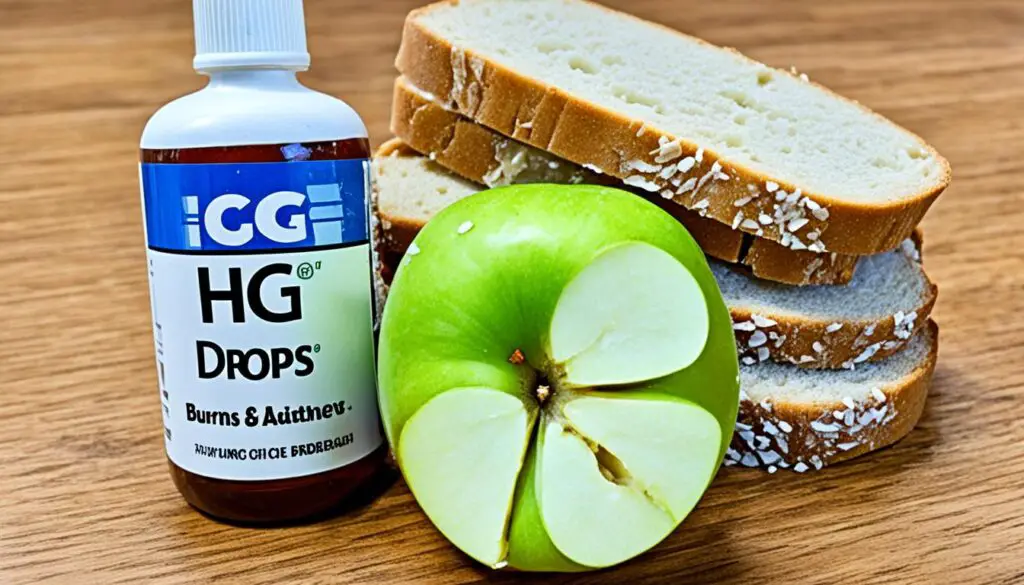
When it comes to the HCG diet, there are numerous scam products on the market that claim to provide homeopathic HCG solutions. However, these products do not contain real HCG and are not regulated by the FDA. It is crucial to understand that only HCG injections prescribed by a healthcare professional are legitimate and safe.
Over-the-counter HCG products are illegal and should be avoided. The safety and effectiveness of these products are highly questionable, and they may even contain unknown ingredients that could be harmful to your health.
Before embarking on any new diet plan, it is always advisable to consult with a healthcare provider who can provide expert guidance and ensure your safety and well-being.
Safety and side effects of the HCG diet
The HCG diet is a controversial weight loss plan that raises concerns about safety and potential side effects. The U.S. Food and Drug Administration (FDA) has expressed doubts about the safety of HCG products and issued warnings regarding fraudulent weight-loss claims. It is important to understand the potential risks associated with this diet before considering it as an option.
While individual experiences may vary, some common side effects and health concerns associated with the HCG diet include:
- Headaches: Some people may experience headaches, which can be attributed to the extreme calorie restriction and potential hormonal fluctuations.
- Depression and Fatigue: The severe calorie restriction can lead to feelings of depression and persistent fatigue as the body lacks energy from proper nutrition.
- Blood Clots: Although rare, there have been reports of blood clots in individuals following the HCG diet. It is crucial to be aware of this potential risk.
The HCG diet’s severe calorie restriction can also result in hunger, nutrient deficiencies, and disordered eating patterns. By limiting caloric intake to just 500-800 calories per day, the body may not receive proper nourishment, leading to imbalances and potential long-term health consequences.
It is essential to prioritize overall health and consider safer alternatives for weight loss, such as a balanced diet and regular exercise. Consulting with a healthcare professional can help determine the best approach for achieving weight loss goals without compromising safety and well-being.
| Side Effects | Prevalence |
|---|---|
| Headaches | Common |
| Depression and Fatigue | Common |
| Blood Clots | Rare but possible |
The bottom line on the HCG diet
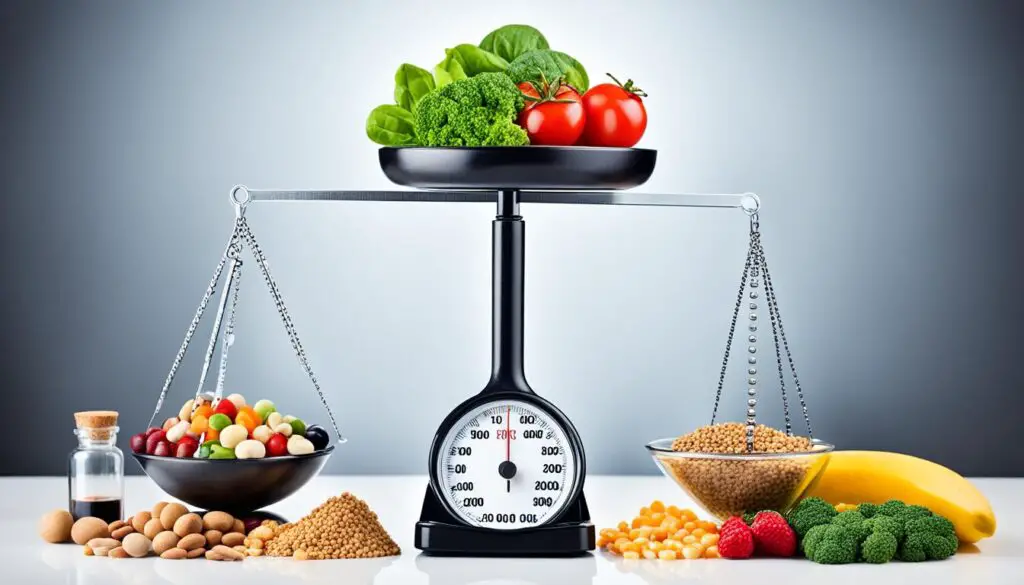
When it comes to the HCG diet, the bottom line is that it promotes rapid weight loss through severe calorie restriction and the use of HCG supplements or injections. However, despite the claims, scientific evidence does not support the effectiveness of the HCG hormone for weight loss. In reality, most of the weight loss achieved on the HCG diet is primarily due to the extreme calorie restriction rather than the hormone itself.
Furthermore, it’s crucial to note that the HCG diet is not recognized as a safe method for weight loss by health experts. Severe calorie restriction can lead to various health risks and side effects, including nutrient deficiencies, muscle loss, and disordered eating patterns. Additionally, the FDA does not approve HCG products for weight loss and has issued warnings about their safety.
Considering the potential risks and lack of scientific evidence, there are many other safer and more sustainable methods for weight loss. It is advisable to consult with a healthcare professional to determine the best approach for individual weight loss goals that prioritize overall health.
Alternative weight loss strategies may include following a well-balanced diet that is rich in nutrients, engaging in regular physical activity, and adopting healthy lifestyle habits. These approaches not only support weight loss but also promote long-term health and wellness.
Key Takeaways:
- The HCG diet promotes rapid weight loss through severe calorie restriction and the use of HCG supplements or injections.
- Scientific evidence does not support the effectiveness of the HCG hormone for weight loss.
- Most weight loss achieved on the HCG diet is primarily due to extreme calorie restriction, not the hormone itself.
- The HCG diet is not recognized as safe by health experts and carries potential risks and side effects.
- Consulting with a healthcare professional and exploring alternative, safer weight loss methods is recommended.
| Pros of the HCG Diet | Cons of the HCG Diet |
|---|---|
|
|
The dangers of the HCG diet
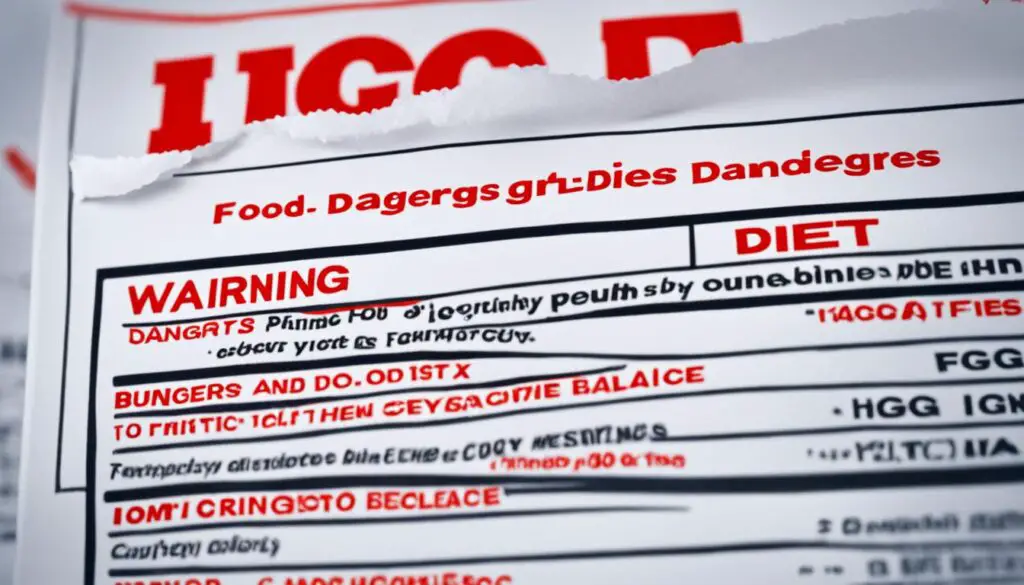
The HCG diet poses significant risks to both physical and mental health. It is crucial to be aware of the potential dangers and consider safe and sustainable weight loss methods instead.
Nutrient deficiencies: The severe calorie restriction imposed by the HCG diet can lead to inadequate intake of essential nutrients, vitamins, and minerals. This can result in fatigue, weakness, compromised immune function, and other health complications.
Muscle loss: With such low calorie consumption, the body may resort to breaking down muscle tissue for energy. This can lead to a loss of muscle mass, decreased metabolism, and a less toned physique.
Hunger and disordered eating patterns: The extreme calorie restriction of the HCG diet can leave individuals feeling constantly hungry, leading to obsessive thoughts about food and a preoccupation with eating. This can contribute to the development of disordered eating patterns and long-term psychological issues.
Unregulated HCG products: Over-the-counter HCG products are illegal and unregulated, meaning their safety and effectiveness are questionable. The use of these products can carry unknown risks and potential harm to your health.
Illegal status: It is important to note that the use of HCG injections for weight loss is illegal and not approved by the FDA. Engaging in any illegal activities can lead to serious consequences. Prioritizing your health and choosing legal and safe weight loss methods is crucial.
Considering the potential dangers, it is advisable to consult with a healthcare professional or registered dietitian before embarking on any weight loss program. They can provide personalized guidance and recommendations that prioritize your overall health and well-being.
The cost and challenges of the HCG diet

The HCG diet can be both financially and physically demanding. Let’s explore the cost and challenges associated with this controversial weight loss plan.
The Cost
While the cost of the HCG diet can vary, one significant expense is the hormonal injections. These injections are typically expensive and may not be covered by insurance, as the use of HCG injections for weight loss is illegal. It’s important to consider the potential financial burden before embarking on this diet plan.
The Challenges
The HCG diet presents several challenges that individuals should be aware of:
- The severe calorie restriction: The HCG diet recommends consuming only 500 to 800 calories per day, which can be extremely difficult to maintain. This level of calorie restriction can lead to hunger, fatigue, and even nutrient deficiencies.
- Potential side effects: Some individuals may experience side effects such as headaches, irritability, and fluid retention while on the HCG diet. These side effects can make the diet even more challenging to adhere to.
- Long-term weight loss maintenance: Sustaining weight loss achieved through the HCG diet can be difficult. As the diet primarily relies on extreme calorie restriction, it may not promote healthy, sustainable habits. Consequently, individuals often regain weight once they return to their regular eating patterns.
Given the cost and challenges associated with the HCG diet, it is recommended to focus on safe and sustainable weight loss methods that prioritize overall health.
| Challenges | Solutions |
|---|---|
| Severe calorie restriction | Consider a balanced diet with appropriate calorie intake and consult a registered dietitian for guidance. |
| Potential side effects | Consult a healthcare professional if you experience any adverse effects and consider alternative weight loss approaches. |
| Long-term weight loss maintenance | Focus on sustainable lifestyle changes, including regular exercise and a balanced diet, rather than relying on extreme diets. |
Conclusion
The HCG diet, a controversial weight loss plan that combines severe calorie restriction with HCG supplements or injections, raises significant concerns regarding safety and effectiveness. The FDA does not approve HCG products for weight loss, highlighting the questionable nature of this diet. While proponents claim that HCG enhances weight loss, scientific evidence attributes the majority of weight loss to the extreme calorie restriction instead of the HCG hormone itself.
Moreover, the HCG diet is associated with numerous health risks and side effects. Gallstone formation, nutrient deficiencies, electrolyte imbalances, fatigue, irritability, and depression are among the potential adverse effects. These risks pose serious concerns for overall health and wellbeing.
Given the potential dangers and the lack of medical endorsement, individuals seeking weight loss should consider safer, more sustainable methods. Consulting with a healthcare professional is crucial for personalized guidance and advice on achieving weight loss goals without compromising health.
FAQ
Is the HCG diet safe and effective?
The HCG diet is not considered safe or effective by health experts. The FDA does not approve of HCG products for weight loss and has issued warnings about their safety. Severe calorie restriction, as recommended by the HCG diet, can lead to health risks and side effects such as gallstone formation, nutrient deficiencies, and electrolyte imbalances. Safer and more effective ways to lose weight are through a balanced diet and regular exercise.
What is HCG and how does it work?
HCG, or human chorionic gonadotropin, is a hormone produced during pregnancy. It is used medically to treat fertility issues but is not approved for over-the-counter use or weight loss. The HCG diet claims that the hormone boosts metabolism and leads to rapid weight loss, but scientific evidence does not support these claims. Studies have shown that weight loss achieved on the HCG diet is solely due to extreme calorie restriction, not the HCG hormone itself. HCG does not significantly reduce hunger or prevent muscle loss.
What are the phases of the HCG diet?
The HCG diet consists of three phases: the loading phase, the weight loss phase, and the maintenance phase. During the loading phase, individuals consume high-fat, high-calorie foods for two days while taking HCG supplements or injections. The weight loss phase involves severe calorie restriction, with only 500 to 800 calories consumed per day, along with continued use of HCG. The maintenance phase gradually increases food intake but avoids sugar and starch for three weeks. The duration of the weight loss phase can vary depending on individual weight loss goals.
What foods are allowed on the HCG diet?
The HCG diet allows for lean proteins such as chicken, beef, and fish, along with specific vegetables like spinach, lettuce, and tomatoes. Fruits like berries, citrus fruits, and apples are also approved. Seasonings can be used to flavor foods, but fats and oils are not allowed. The diet recommends drinking plenty of water and allows for coffee and tea, sweetened with stevia or saccharin. Other foods, including dairy products, grains, sugars, and desserts, are not allowed on the HCG diet.
Are there scam products on the market?
Many HCG products on the market are labeled as homeopathic, but they do not contain real HCG and are not regulated by the FDA. Only HCG injections prescribed by a healthcare professional are legitimate. Over-the-counter HCG products are illegal and should be avoided. The safety and effectiveness of these products are questionable, and they may contain unknown ingredients. It is important to consult with a healthcare provider before starting any new diet plan.
What are the safety and side effects of the HCG diet?
The HCG diet is not considered safe by health experts. The FDA has questioned the safety of HCG products and issued warnings about fraudulent weight-loss claims. Side effects of the HCG diet may include headaches, depression, fatigue, and blood clots. The severe calorie restriction on the diet can lead to hunger, nutrient deficiencies, and disordered eating patterns. It is important to prioritize overall health and consider safer weight loss options.
What is the bottom line on the HCG diet?
The HCG diet promotes rapid weight loss through severe calorie restriction and HCG supplements or injections. However, scientific evidence does not support the effectiveness of the HCG hormone for weight loss. Most weight loss achieved on the HCG diet is due to extreme calorie restriction and not the hormone itself. The HCG diet is not recognized as safe by health experts, and there are many other safer and more sustainable methods for weight loss. It is recommended to consult with a healthcare professional to determine the best approach for individual weight loss goals.
What are the dangers of the HCG diet?
The HCG diet is highly unsafe, unhealthy, and illegal. The severe calorie restriction and use of unregulated HCG products can lead to numerous health risks and side effects. It can cause nutrient deficiencies, muscle loss, hunger, and disordered eating patterns. Over-the-counter HCG products are illegal, and their safety and effectiveness are questionable. It is important to prioritize overall health and consider safe and sustainable weight loss methods.
What is the cost and challenges of the HCG diet?
The cost of the HCG diet can vary, but the hormonal injections are typically expensive. However, it is important to note that the use of HCG injections for weight loss is illegal. The HCG diet can be challenging due to the severe calorie restriction, potential side effects, and difficulty in maintaining long-term weight loss. It is recommended to focus on safe and sustainable weight loss methods that prioritize overall health.

